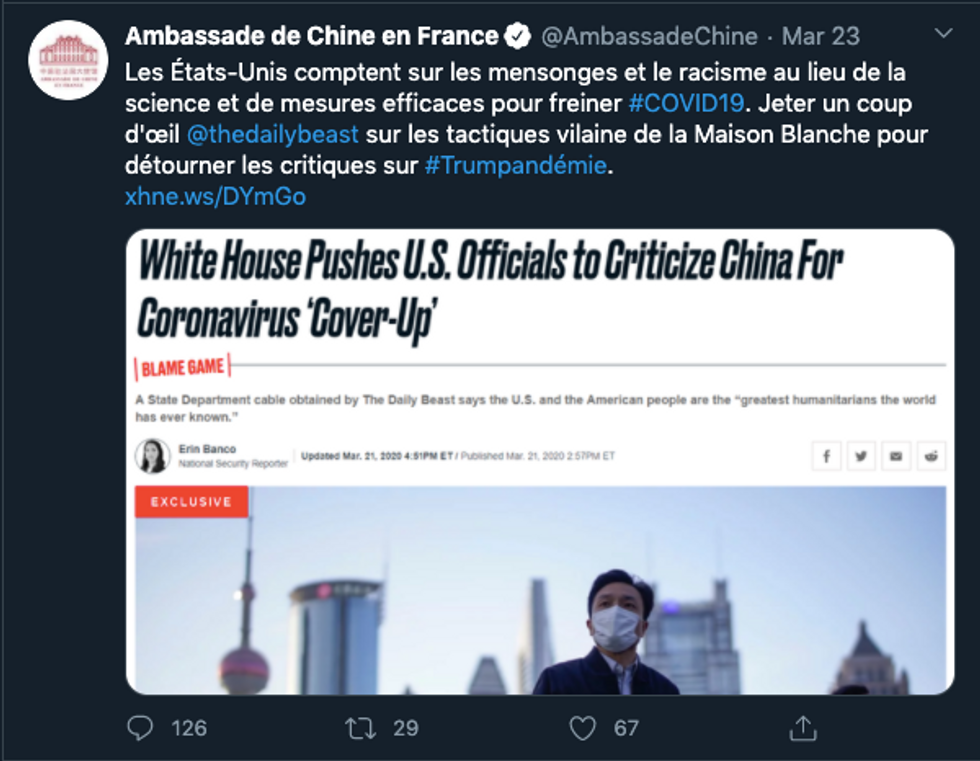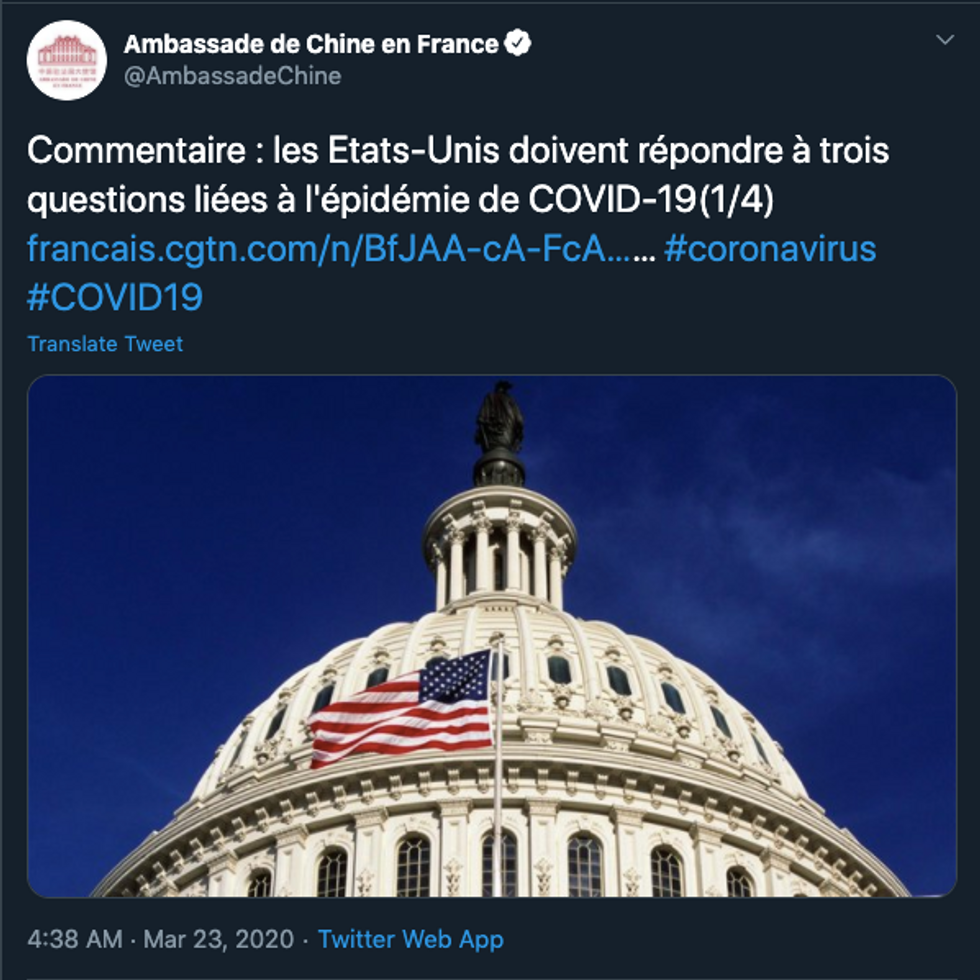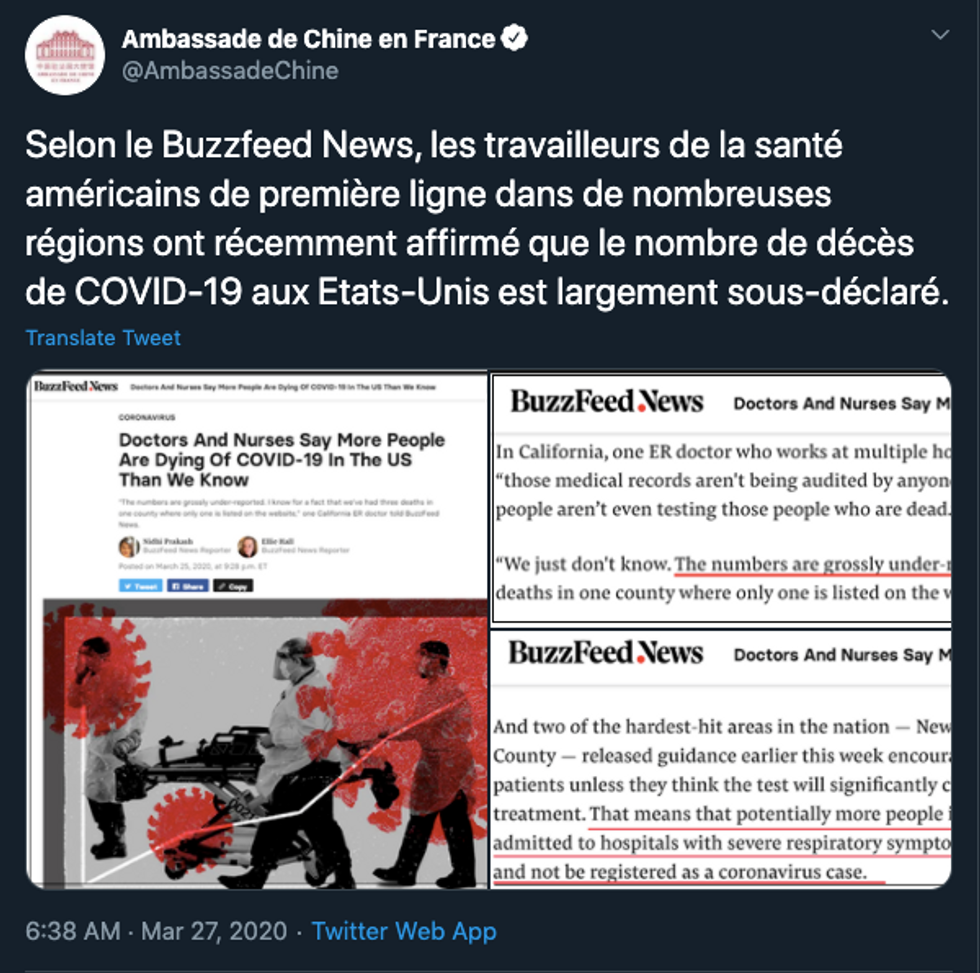An official press release by the Chinese Embassy in France recently claimed that Chinese efforts to contain the COVID-19 pandemic are regarded by French officials as an “inspiration” and a source of “admiration and envy” of the Chinese Communist Party’s model of governance. “It was the ‘dictatorship’ to which the world first sought help from, and not the American flagship of democracy,” the release asserted.
These words are just a snippet, but they demonstrate how attempts to shape the narrative around the pandemic have made Europe an information battleground. Already dragged into the United States’ trade war with China, European Union policymakers have been faced with difficult decisions in recent years over a range of topics like the Belt and Road Initiative and the adoption of 5G technology. Having been the epicenter of the COVID-19 spread this past month, Europe is now host to adversarial messaging emanating from the two powers, highlighting both its importance and the complicated road ahead of it.
Given the economic and reputational stakes for both Washington and Beijing, the CCP seeks to discredit the United States’ healthcare system, while the current U.S. administration opts to skirt past missteps at home by pointing the finger abroad. As a result, information operations have turned to the weaponization of the virus for the benefit of promoting one state’s greatness over the other.
For China, projections estimate minimal, if not negative GDP growth for the year, compounded by a partial exodus in manufacturing. Given that CCP legitimacy is predicated on guarantees of economic advances, a surge in nationalism is now part of its agenda.
For the United States, the outbreak could increase unemployment to staggering levels. Between U.S. leadership repeatedly referring to COVID-19 as the “Chinese” or “Wuhan” virus, and the CCP’s continued gaslighting on the origins of the pandemic — the fracturing of multilateralism leaves Europe’s liberal future in a perilous position.
Since the crisis, Chinese government officials’ activity on social media has increased exponentially, despite the fact that many of the same platforms they are using are banned in the mainland. Indeed, the number of Twitter accounts connected to Chinese embassies, consulates, and ambassadors has increased by more than 250 percent. In Western Europe, Chinese embassies routinely boast about the mainland’s handling of the crisis and Beijing’s generosity in helping foreign countries cope, vindicating its political model as a harbinger of stability, in contrast to the United States.
In examining the Chinese government’s official tweet-sphere, narratives vary from praising the CCP in its efforts to contain the outbreak to critiquing Donald Trump’s handling of the pandemic and casting doubt on Washington’s ability to manage the crisis. A public statement from the Chinese Embassy in Paris goes so far as to compare European political systems with those of China. Such posts are then retweeted by Chinese embassies in Francophone Africa, amplifying the narrative.
Through the Chinese Global Television Network’s French channel, the claim that the United States might be at the origin of the virus was propagated to its audience. The news agency further stated that, “Even if American politicians are loud, they are still unable to put the blame on others” and that “gray areas in the prevention and control of the epidemic in the United States are beginning to be highlighted.”
In addition, CGTN’s podcast series has maintained that Xi Jinping is leading the fight against COVID-19, asserting that he “personally guided and deployed the Chinese people to lead the containment battle, which is also the people's joint battle against the COVID-19 epidemic.”
Episodes of the podcast have then been shared by official Chinese government accounts on Twitter, including by consulates and embassies across France and Francophone Africa. All these messages aim to extol China’s efforts in combating the outbreak while discrediting those of the United States.

Indeed, the pandemic’s global repercussions have forced the CCP into taking a more confrontational approach to information manipulation that appears to be drawn from Russian tactics. Its influence efforts are now bent on shaping the narrative behind the blame, statistics, and containment of the virus.
China’s propaganda efforts have multiple goals. Internally, they seek to legitimize the regime after initial errors in crisis management. Externally, they seek to discredit democracies by highlighting their failures in coping with the outbreak. In addition, as noted by Foreign Policy’s James Palmer, they validate the claim that the Chinese diaspora can only feel safe in the mainland.
But China’s propaganda has also been matched with responses on the American front. Right-wing figures such as Senator Tom Cotton have led the charge, openly spreading a corrosive theory claiming that the virus originated in a laboratory in Wuhan — claims that have found resonance with their political counterparts in France. Compounded with Representative Paul Gosar’s coinage of the “Wuhan Virus” moniker and Mitt Romney’s call for a National Security Council task force, the current U.S. administration is on course to further degrade the multilateralism the United States worked so hard to create after World War II.
In a world where China is sufficiently confident in its global narrative to launch an international debate on global health governance, and where the U.S. pronounces its supposed exceptionalism over ally and foe alike, many other Western democracies find themselves caught between a rock and a hard place. From one end, they are offered help by a regime that asks little but to consent to its narrative, and from the other, they are denied aid by a historic ally that has descended into isolationism and embraced brutal competition for scarce, life-saving resources.
In the absence of a coherent response from the United States, the pandemic has paved the way for China to bolster its ambitions and validate its political values. These ambitions may lead to the legitimization of authoritarian narratives around governance and the materialization of a new form of multilateralism.


















